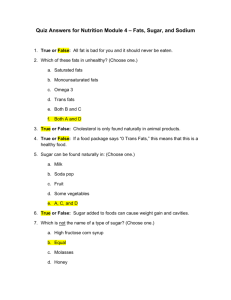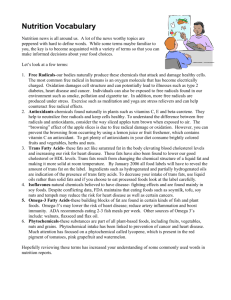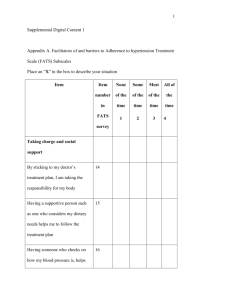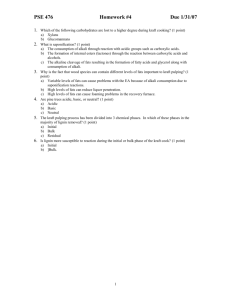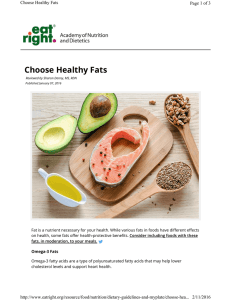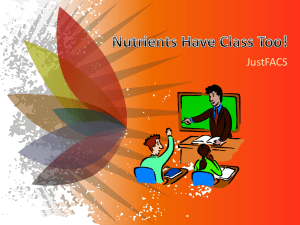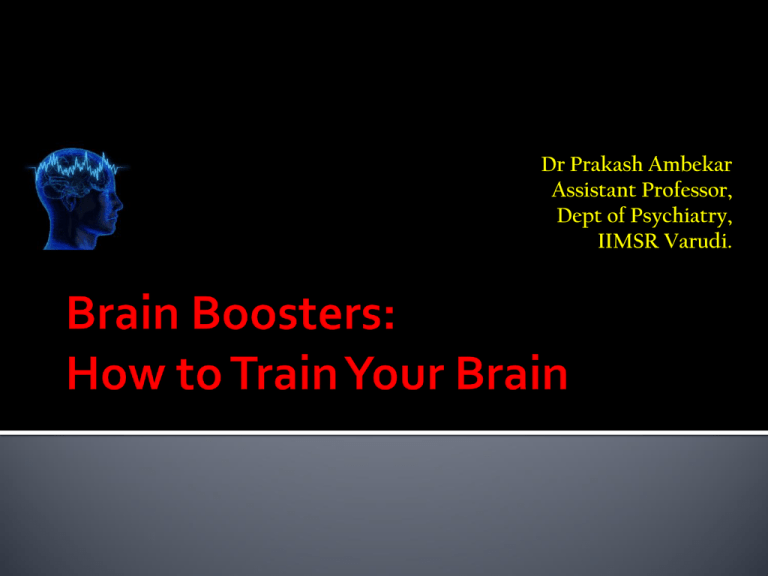
Dr Prakash Ambekar
Assistant Professor,
Dept of Psychiatry,
IIMSR Varudi.
Why????
Lifestyles
Sleep
Lifestyles
Laughter therapy
Diet
Thinking helps
Exercise
Cognitive aids
▪ Physical
▪ Cognitive
Meditation
Study skills
Stress management
Born 11 October 1942
François Truffaut One-man industry
Actor 3 National Film Awards
14Filmfare Awards
Playback singer
Producer
Television shows
Angry Young Man
Ben Franklin left public service at age 82.
Mary Baker Eddy founded The Christian
Science Monitor at age 86.
Robert Frost published his last collection of
poems at age 88.
George Bernard Shaw wrote play at age 94
Grandma Moses received a painting
commission at age 99.
Omega - 6 Fats
Oils and dressing
Pork and beef
Processed foods
Fried foods
Omega - 3 Fats
Fish and seafood
Nuts and legumes
Green leafy plants
Olive oils
BAD FOR BRAIN
cause neurons to
become more rigid
GOOD FOR BRAIN
cause neurons to
become more fluid
SODIUM (Na)
In processed foods
In table salt
Causes brain tissue
and blood vessels to
become more
permeable
High levels decreases
brain performance
Potassium (K)
In fruits and veggies
In beans, nuts, milk
In some fish
Counteracts high
sodium levels
Low ratios of sodium to
potassium increase
brain performance
Benton (1991) - 6 year olds given
multivitamins for 6-8 weeks increased and
average of 7.6 points on intelligence tests
Murphy (1998) - School aged children who
ate breakfast performed much higher in math
than those who skipped breakfast
less behavior problems and absences
Greenwood (1996) - Rats fed varying diets
high in saturated fats showed cognitive
impairment in direct correlation to the
amount of fats consumed
Connor (1996) - Rhesus monkeys fed low
amount of Omega-3 fats with high Omega-6
fats showed cognitive damage and vision
impairment
B complex
B6, B12, and Folic Acid (B9)
Spinach and other dark, leafy greens; broccoli,
strawberries, melons, black beans, leeks, and other
legumes
Anti-oxidants-
Vitamins C, E, and beta carotene
blueberries, strawberries, and other berries; sweet
potatoes; red tomatoes, spinach, broccoli, green tea and
other types of tea, nuts and seeds, and citrus fruits such as
oranges and grapefruits
Acetyl L-carnitine
Protect brain cells
Eat Breakfast
Consume healthier snacks (fruit not chips)
Decrease Intake of Saturated Fats
Decrease Omega-6 fat to Omega-3 fat Ratio
Decrease Sodium to Potassium Ratio
Take a Multivitamin (even Fish Oil)
Picture Puzzles
Strategy Games
Chess
Crossword Puzzles
Card Games
Deduction Games( Clue)
SUDOKU
Visualization Puzzles
Optical Illusions
Reading
Stimulates the brain as it activates your
imagination
Helps with memory retention and problem solving
Reading a mystery self-help books stimulate your
brain by helping you to think for yourself, as well
as find solutions in your mind.
Helps circulate oxygen to your brain
Exercise over a long period
Increase brainpower and even create new neurons .
Deep breathing for 10 minutes daily delivers
more oxygen to the brain and improves its
functionality
Walking
Allows you to clear your mind and thoughts
Gives your brain a chance to wander freely, clearing it
of any troublesome thoughts.
During meditation, people typically rest in a
quiet location and focus their mind on a
particular thought or activity
Increases IQ, relieves stress
Promotes a higher level of brain functioning
Stimulates the PFC
Advanced thinking ability & performance
Alleviates physical problems, like controlling
pain and symptoms of chronic diseases
Strengthens the right hemisphere of the
brain and changes its structure
People who listen to music are shown to be
more emotionally intelligent than those who
don’t
Writing articles, blogs, or journal entries
Improves memory and thought expression
Stimulates thought processes
Enhances brain function
Painting and drawing
Sparks the creativity within you
Even if you’ve never tried painting before, give it a
shot
You’ll find that you feel more creative and enjoy it
Drawing stimulates the creative side of your brain
Long-term Memory
Explicit Memory
Episodic
Memory
Semantic
Memory
NREM
Implicit Memory
Procedural Classical
Memory Conditioning
REM
Priming
It be defined as that which
makes us laugh, smile,
or amuses us.
Source:Making Humor Work, Terry L. Paulson, Ph.D.,1989
“We don’t laugh because we’re
happywe’re happy because we
laugh.”
~William James
OnTrackOptions.com
Release of anxiety or nervousness
Maintain a sense of control over life
Breaks down interpersonal barriers
Increases pleasure, reduces pain
Physiological homeostasis
Promotes general well-being
Release of anger
Purifies the emotions
C Changa, G Tsaia, C Hsieh.Psychological, immunological andphysiological effects of a Laughing
QigongProgram (LQP) on adolescents. Complementary Therapies in Medicine (2013) 21, 660—668
No cholesterol!
No calories!
Non-fattening!
No adverse side effects!
All natural and innate!
No genetically modified
ingredients!
Non-polluting!
And it’s Free!
OnTrackOptions.com
B +ve
Overlearn the Material
Make It Meaningful
Familiarity
Rhymes
Patterns
Minimize Intervening Activity
Don't Study Similar Subjects Together
Study Different Subjects in Different Rooms
The Limits of Attention
Consolidation During Breaks
Differing Contexts/Moods
Serial Position Effect
Stress affects everyone and is an essential and inevitable part of
life
Complete freedom from stress is impossible
Admitting to yourself or others that you are suffering from stress
is not a sign of weakness
Stress is a great motivating force
Managing stress is important because : It reduces risk of ill health.
Enhances family and social relationships.
Improves performance and creativity.
DEMANDS
LIFE
COPING
ABILITY
A. Prevent it
▪ Avoid unnecessary stress
▪ Learn to say ‘NO’
▪ Avoid ‘Perfectionism’
▪ Practice more patience
B. Set goals
▪ One year
▪ Monthly
▪ Weekly
▪ Daily
▪ Schedule, schedule,
schedule…
C. Establish priorities
▪ Plan ahead
▪ Make “to do” lists- in order of importance
▪ Do most important- drop some
D. Take time out
▪ Spend a few minutes each day alone to break
routine (or socializing!)
▪ Set aside time each week for recreation
▪ Exercise regularly
E. Have faith (meditate, pray, worship)
F. Think positively
▪ Maintain a positive attitude – To give you
more control
▪ Negativity wastes energy
▪ Practice “I can” rather than “I can’t”
G. Communicate
▪ Talk over your concerns and feeling
with a friend, family member, teacher
▪ “Talking-it-out” relieves stress and gives you insight
▪ Learn to listen and consider suggestion with an open
mind
H. Make decisions
▪ Don’t resist change if it is needed
▪ Make a choice and move on
I. Have a regular Sex
J. Get support
▪ If you problems are too much to discuss with a
friend or family member OR
▪ You feel they would be too much of a burden- get
professional assistance!
▪ Remember you are NOT alone
Instead of spending all our energy in trying to
avoid stress, which may well be impossible, it
may be more beneficial to develop coping
skills to face stress
Holding on to anger is like holding on to a
hot coal with the intent of throwing it at
some one else: you are the one who gets
burnt
-Gautam Buddha
Planning
Maintain diary
Mobile reminders
Brain Boosters
B+ve
Smile More
The
Last
Laugh
Physical
Exercise
Make a Hobby
Stress
Management
Diet
Cognitive
exercise
Sleep
How to Be a Genius Your Brain and How to Train It
Brain - The Complete Mind How It Develops, How It
Works, and How to Keep It Sharp
How to Think Like Sherlock: Improve Your Powers of
Observation, Memory and Deduction
Keep Your Brain Alive - 83 Neurobic Exercises to Help
Prevent Memory Loss and Increase Mental Fitness
The Memory Book - The Classic Guide to Improving
Your Memory at Work, at School, and at Play
Thinking, Fast and Slow (2011) –Mantesh
Various journals

